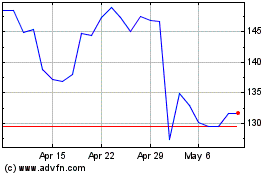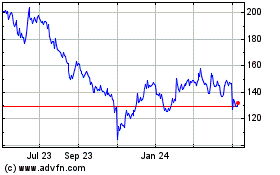By Sharon Terlep and Matt Grossman
This article is being republished as part of our daily
reproduction of WSJ.com articles that also appeared in the U.S.
print edition of The Wall Street Journal (May 2, 2020).
Americans' dramatically altered spending habits amid the
coronavirus pandemic upended financial results for some of the
biggest consumer-products companies.
Clorox Co. and Colgate-Palmolive Co. on Friday reported soaring
sales for the most recent period as people amassed cleaning
products, soaps and vitamins. Meantime, beauty giant Estée Lauder
Cos. reported an 11% sales decline and swung to a $6 million
quarterly loss as global shutdowns cut off consumers' access to
high-end beauty products from Clinique skin cream to M.A.C.
makeup.
The results were reversals of fortune for Clorox and Estée
Lauder in particular. Before the pandemic, Clorox had been
struggling with tepid sales gains relative to rivals, and Estée
Lauder was far outperforming its competitors.
Even companies experiencing sales increases amid the pandemic
stressed uncertainty ahead.
"The unpredictability that we've seen across the world is unlike
anything we've seen before, it's very difficult to get a line of
sight on how things are going to unfold," Colgate Chief Executive
Noel Wallace said in a call with analysts. "The biggest unknown for
us is the degree of the recession all over the world."
Clorox, which posted its highest quarterly sales gain in 20
years, took the unusual step of increasing its forecast for the
year, predicting both higher sales and profits. The company's
brands include in-demand items from Clorox disinfectant wipes to
Rainbow Light vitamins. Most of its sales are in the U.S., which
largely insulated Clorox from the shutdown in China earlier this
year and from currency volatility affecting rivals.
The company now expects to report year-over-year sales growth of
4% to 6%. In early February, the last time it offered such
guidance, Clorox had said the year-to-year change in sales would be
between 1% growth and a single-digit percentage decline.
Clorox said sales of its cleaning products, which includes wipes
and bleaches, grew 32% year over year between January and March.
Overall, the company's revenue increased 15% to $1.78 billion in
the period, the third quarter of its fiscal year.
Colgate-Palmolive also reported a surge in demand. North
American sales of personal- and home-care products, which include
Colgate toothpaste and Softsoap hand soap, grew 8.9% in the period
compared with the same time last year, the company said Friday.
Overall, Colgate's first-quarter revenue grew 5.5% to $4.1
billion.
Estée Lauder, in turn, reported its weakest quarter since the
recession, with sales down 11% to $3 billion for the latest
quarter.
"Brick-and-mortar was completely closed and the consumer was
shocked," in March, Estée Lauder CEO Fabrizio Freda said in a call
with analysts.
Sales in Estée Lauder's Americas segment tumbled 23% as stores
in North America and elsewhere remained closed because of the
pandemic and lockdowns reduced demand for makeup and
fragrances.
The New York-based cosmetics company said while many retail
locations have been opening in Asian markets including China, where
sales have begun to rebound, closures elsewhere continue to weigh
on its overall results. Sales at airports and other duty-free
shops, which are profit centers for the company, also continue to
be hit hard by curtailed air travel globally.
Mr. Freda said the company expected a swath of retailers would
never reopen, accelerating the beauty industry's shift online.
Ultimately, he said, Estée Lauder was well-positioned to compete in
such a shakeout, but the "transition is coming to be complex and
difficult," he said.
Also reporting results on Friday was Newell Brands Inc., the
maker of Crock Pots, Sharpie pens and other household products. The
company said sales plunged 25% in April and significant disruptions
are likely in the second quarter. Sales fell 7.6% to $1.89 billion
in the March ended quarter and Newell posted a $1.28 billion net
loss after recording a $1.5 billion impairment charge.
Newell said about 20 of its 135 manufacturing plants were
temporarily closed in March or April because of the coronavirus
pandemic, including a home fragrance factory in South Deerfield,
Mass. The company has furloughed about 5,000 workers and
temporarily closed its Yankee Candle retail stores in North
America.
Newell withdrew its financial forecasts for the full year and
second quarter. The Atlanta company said it was hopeful its
business would improve in the second half of the year, but the
pandemic's disruptions to consumer demand and its supply chain make
it too difficult to set targets.
Newell CEO Ravi Saligram told analysts he was "heartened" by
early signs that business was picking up and the company had
resumed more regular production. He said he expected sales would
improve throughout the year and anticipated workers would return to
offices this summer and students will be in school by fall.
Colgate also withdrew its guidance for the 2020 calendar year,
citing uncertainty around the virus and the economy. Mr. Wallace,
the CEO, said further coronavirus-related shutdowns, potential
production interruptions, currency volatility and the worsening
economy could threaten growth.
Write to Sharon Terlep at sharon.terlep@wsj.com and Matt
Grossman at matt.grossman@wsj.com
(END) Dow Jones Newswires
May 02, 2020 02:47 ET (06:47 GMT)
Copyright (c) 2020 Dow Jones & Company, Inc.
Estee Lauder Companies (NYSE:EL)
Historical Stock Chart
From Mar 2024 to Apr 2024

Estee Lauder Companies (NYSE:EL)
Historical Stock Chart
From Apr 2023 to Apr 2024
